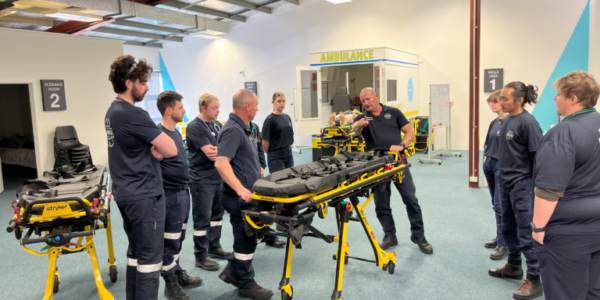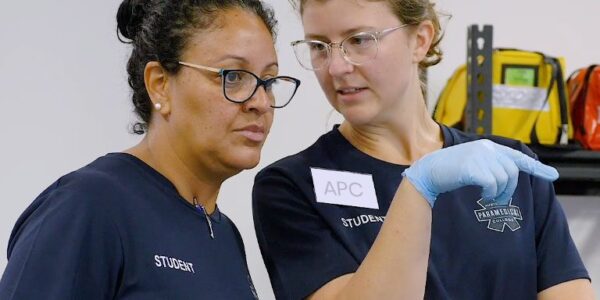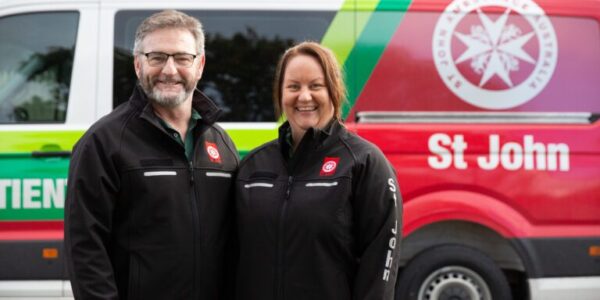Re-published 19th February 2024
Whilst we may be biased in saying so, a career in paramedicine is extremely fulfilling. Whether your goal is to work in the private sector as a paramedic, or as an ambulance paramedic for Ambulance Victoria, it’s a fast-paced job with no day ever the same, offering you the chance to genuinely give back to your community.
Being so highly regarded, the educational requirements to work as a paramedic, or commence a paramedic course can be competitive. We’re excited to share with you today the two pathways one can take to study paramedicine in Victoria – plus give yourself the competitive edge when it is time to apply for the job!
Pathways to study a Bachelor of Paramedicine in Victoria
Overall, there are two ways one can get into university across Australia* – direct entry or VET entry. Whilst each offers the same result (you graduating and being able to hold the title of ‘paramedic), VET entry does have significant advantages that should be considered.
*Please note that not all universities offer VET entry – please ensure to do your research before applying.
What is a direct entry paramedicine pathway?
Direct entry can be undertaken by an individual who has satisfactorily received and fulfilled all of the entry requirements to study at university. The biggest factor of this comes down to your ATAR (previously referred to as OP). For example, to study a Bachelor of Paramedicine at Victoria University, the current minimum ATAR required is 82.10 (approx OP 9) to be considered for entry*.
*Source: Victoria University (2024)
Achieving this ATAR does not automatically grant you entry, it means that your application will be considered. Should it be accepted, you’ll receive entry to study in their next intake. A Bachelor of Paramedicine can take up to 3 years to complete full-time, with a Master of Paramedicine taking approximately 1.5 years full-time.
What is a VET entry paramedicine pathway?
To begin, VET stands for ‘Vocational Education and Training’. It encompasses Certificates and Diplomas ranging from trade and construction to childcare and healthcare, providing individuals with the chance to get employment-ready or gain training in a specific area to bridge a gap in their knowledge. VET offers individuals the chance to upskill or re-skill to expand their strengths and build up weaknesses.
To simplify this even further for those wishing to apply to university, VET entry into a paramedicine course such as a Bachelor of Paramedicine can provide you with the chance to study the course even if you didn’t receive the ATAR required to gain direct entry. The skills you have learnt in your desired course (such as APC’s HLT51020 – Diploma of Emergency Health Care) can give you the chance to apply for not only entry into the degree but also lessen your course fees and course requirements!
Potentially the best news of a VET entry paramedicine pathway is that it allows you to work within the industry during your degree as you are already qualified for an Emergency Medical Technician (or similar) scope of practice. Who wouldn’t want to earn whilst they learn?
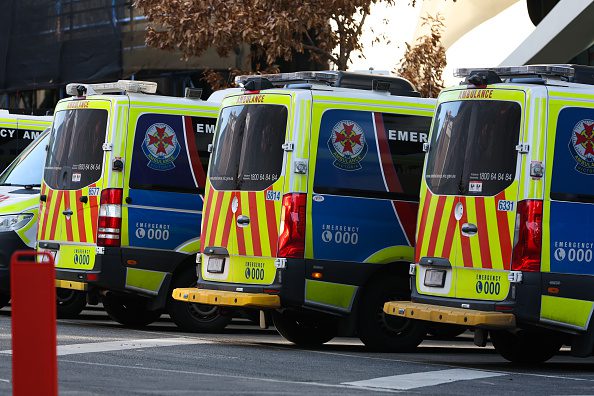
Where can I study a Bachelor of Paramedicine?
The paramedic profession in Australia changed in late 2018. Legislation was passed to bring the industry into line with other healthcare professions, meaning to call yourself a paramedic you must study at a recognised university approved by the Council of Ambulance Authorities Inc.
Studying a Bachelor’s degree will open up many employment opportunities in the paramedical sector. Typically, the full degree takes around three years to complete and can cost anywhere upwards of $70,000.00*. Please note that costs between universities will vary so it is encouraged for all to do their research before applying. As mentioned above, those who decide to complete a course in VET before applying may be eligible for credits on their course length, and fees.
*Source: Edith Cowan University (2024).
The following is a list of universities offering degrees in paramedic science, paramedicine, paramedic practice and/or paramedic health science:
| Course Name | Course Provider | Location |
| Bachelor of Health Science (Paramedic) | Victoria University | Melbourne, VIC |
| Bachelor of Paramedicine | Monash University | Mornington Peninsula, VIC |
| Graduate Diploma of Paramedicine | Federation University Australia | Ballarat, VIC |
| Bachelor of Nursing/Bachelor of Paramedicine | Australian Catholic University | Ballarat, VIC |
| Bachelor of Paramedicine | Australian Catholic University | Melbourne, VIC, Brisbane, QLD and Canberra, ACT |
| Bachelor of Paramedic Practice with Honours | La Trobe University | Bendigo, VIC and Brisbane, QLD |
| Bachelor of Paramedicine with Honours | Charles Sturt University | Bathurst, NSW and Port Macquarie, NSW |
| Graduate Diploma of Clinical Practice | Charles Sturt University | Bathurst, NSW |
| Bachelor of Health Sciences (Paramedic) | Flinders University | Adelaide, SA |
| Bachelor of Paramedic Science | Flinders University | Adelaide, SA |
| Bachelor of Paramedic Science | CQUniveristy | Cairns, Rockhampton and Townsville, QLD |
| Bachelor of Paramedic Science | Queensland University of Technology | Brisbane, QLD |
| Bachelor of Paramedicine | University of the Sunshine Coast | Sunshine Coast, QLD |
| Bachelor of Science (Paramedical Science) | Edith Cowan University | Perth, WA |
| Bachelor of Paramedic Practice | University of Tasmania | Hobart, TAS and Sydney, NSW |
| Bachelor of Health Science (Paramedic) | Auckland University of Technology | Auckland, NZ |
| Bachelor of Health Science (Paramedic) | Whitireia Community Polytechnic | Wellington, NZ |
Australian Paramedical College is proud to be associated with the following universities that have accepted our Diploma graduates into the degree program in prior years:
- Central Queensland University (CQU) – Bachelor of Paramedic Science
- Edith Cowan University (ECU) – Bachelor of Science (Paramedical Science)
- Charles Sturt University (CSU) – Bachelor of Paramedicine
- University of Tasmania (UTAS) – Bachelor of Paramedic Practice 53A
- Victoria University (VU) – Bachelor of Paramedicine
- University of Western Sydney – Bachelor of Health Science (Paramedicine)
Many universities offer credits towards the degree (usually around 30%) because the HLT51020 – Diploma of Emergency Health Care is highly recognised as an Australian Qualifications Framework (AQF) level 5 qualification.
As a guide, the following Bachelor of Paramedic Science courses/subjects were awarded to APC Diploma graduates. Please be advised that each university can have slightly different course structures and the subjects can vary.
- Human Body Systems – Anatomy and Physiology 1
- Human Body Systems – Anatomy and Physiology 2
- Skills in Paramedical Practice 1
- Skills in Paramedical Practice 2
- Paramedic Clinical Practice 1
- Paramedic Clinical Practice 2
- Foundations and Principles of Paramedic Science
- Foundations of Professional Paramedic Practice
- Systems Physiology
- Australian Health and Social Care Systems and Policy
- Cultural Studies
- Pre-hospital Ethical and Legal Issues
- Principles of Drug Actions For Health Professionals
How to apply for a career as a paramedic with Ambulance Victoria
One of the largest requirements for applying for a career with Ambulance Victoria is your registration as a ‘Registered Paramedic’.
Once you graduate from university, the natural next step for an individual is to register themselves with ‘The Board’, via the Australian Health Practitioner Regulation Agency (AHPRA). This board ensures that all registered healthcare professionals across Australia are suitably trained and qualified to practise – overall easing the recruitment processes of employers in the healthcare industry*.
*Source: AHPRA (2024)
Alongside your registration as a Paramedic, you’ll need to hold a full Victorian driver’s license, a good level of health and fitness and other personal skillsets such as strong communication, ease of clear decision making, adaptability etc.*
*Ambulance Victoria (2024)
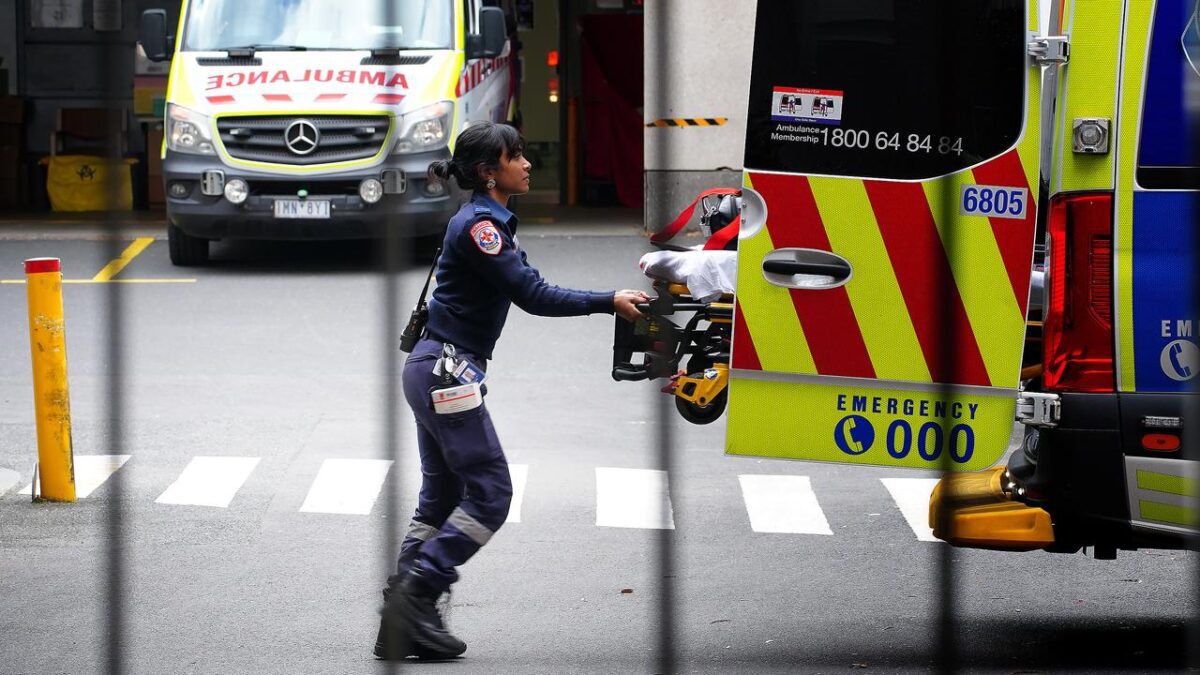
Types of Paramedics working at Ambulance Victoria
Ambulance Victoria services more than 6 million individuals annually across 227,000 km2*. Whilst they employ both clinical and non-clinical roles, we will discuss the clinical roles of a paramedic one can fulfil in this blog.
*Ambulance Victoria (2024)
Graduate Ambulance Paramedic with Ambulance Victoria
If you’ve recently graduated from university with a Bachelor of Paramedic Science, Paramedine (or similar), you could be eligible to apply for this role. As a recent graduate you will work under a Clinical Instructor you will be guided over 12-24 months receiving training on the familiarisation of Ambulance Victoria processes before you can work in a ‘Qualified Paramedic’ position.
Qualified Paramedic at Ambulance Victoria
The majority of all paramedics at Ambulance Victoria hold this title, working to an Advanced Life Support (ALS) scope of practice. During you will attend all times of emergencies ranging from low to high acuity, providing life-saving care to patients across Victoria.
Air Ambulance Paramedic for Ambulance Victoria
Going sky-high, paramedics who work as MICAs (keep reading to understand what this role is) or Qualified Paramedics can additionally work as Air Ambulance Paramedics, offering medical support in the air. Ambulance Victoria has their own specially equipped helicopters and aeroplanes to perform rescues. On occasion, you could even find yourself offering water support via a boat. If this type of career excites you, APC’s Industry Partnership with AirMed and GroundMed could be perfect for your Clinical Placement! Check out what they could offer you as a student studying the HLT51020 – Diploma of Emergency Health Care or HLT41120 – Certificate IV in Health Care, click here.
Bicycle Response Paramedic at Ambulance Victoria
Going to the opposite end of the spectrum of motors, Ambulance Victoria employs Bicycle Response Paramedics who provide medical support at special events across Victoria.
Clinical Instructor with Ambulance Victoria
As a Clinical Instructor at Ambulance Victoria, you are in the exciting role of providing 1-1 guidance to Graduate Paramedics and Qualified Paramedics! This support directly offers all newly employed paramedics guidance in finding their feet with Ambulance Victoria as a paramedic.
Wilderness Response Paramedic for Ambulance Victoria
Working remotely, Wilderness Response Paramedics are specifically trained to work alongside the Victorian Police Force, State Emergency Service (SES), Country Fire Authority (CFA) and others to provide emergency medical support.
Mobile Intensive Care Ambulance (MICA) Paramedics (exclusively at Ambulance Victoria)
MICA Paramedics are exclusive to Ambulance Victoria, having some of the most advanced skillsets in paramedicine one can hold. You can learn more about this specialised position in our dedicated blog post linked here.
What is the salary of a Paramedic working with Ambulance Victoria?
We’ve officially gotten to the burning question and for a valid reason. As inflation continues to occur, everyone wishes to have a job that they not only love but can feel financially supported by.
To deliver the good news – a career as a paramedic can give you the best of both worlds, plus transparency as to ‘what to expect’ as you progress within the service. Each jurisdictional ambulance service across Australia offers an enterprise agreement that informs all employees of their rates*.
*Ambulance Victoria Enterprise Agreement (2024)
For your convenience we have gathered the data from the current 2020 agreement for your review below, showcasing the current 2023 rate of pay:
Graduate Ambulance Paramedic weekly wage at AV
A Graduate Ambulance Paramedic can expect to earn up to $1,334 each week.
Qualified Ambulance Paramedic weekly wage at AV
Weekly, a Qualified Ambulance Paramedic could expect to earn approximately $1,746.
Air Ambulance Paramedic weekly wage at AV
As an Air Ambulance Paramedic, expect up to $2,498 a week.
Clinical Instructor/Paramedic Instructor weekly wage at AV
An individual working as a Paramedic Instructor has the potential to earn around $2,057 weekly.
MICA Paramedic weekly wage at AV
The most experienced MICA Paramedic could earn up to $2,839 a week.
Ready to start working towards a career with Ambulance Victoria?
If VET entry into paramedicine sounds like the pathway for you, we’d love to work with you to pursue your dream career!
Australian Paramedical College (APC) is Australia’s leading specialist college for pre-hospital healthcare in emergency and non-emergency. With our guidance, you can gain the skills and confidence to commence a career that has the offering to make a difference.
Click the button below to start the journey through our HLT51020 – Diploma of Emergency Health Care.
